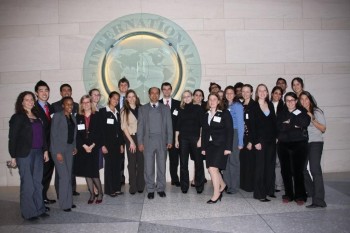An Inside Look at the International Monetary Fund

The Haverford delegation at the D.C. headquarters of the IMF.
Details
Before joining Haverford in 2009 as a visiting professor of economics, Biswajit Banerjee spent 26 years as a senior staff member at the International Monetary Fund (IMF). Banerjee returned to the IMF in December. But this time he brought along 24 Haverford students.
Those students joined Bannerjee and fellow economics professors Saleha Jilani and Anne Preston on a day-long field trip to the IMF's Washington, D.C. headquarters that was made possible by funding from the Center for Peace and Global Citizenship. (CPGC International Program Coordinator, Alison Castel, was also part of the Haverford delegation.)
The visit built upon concepts presented in Banerjee's class“The Economics of Transition and Euro Adoption in Central and Eastern Europe.”
“We wanted to widen the horizons of students by providing them firsthand experience on the workings of international economic policy making,” says Banerjee, whose long association with the IMF was instrumental in making the trip a reality and ensuring students' access to high-level speakers and meeting rooms.
During the visit, students listened to a talk by IMF Executive Director Age Bakker, of the Netherlands, who gave an overview of the IMF's structure, discussed its various roles as economic“firefighter,”“coach,” and“architect,” and detailed the effect of the global economic crisis on Eastern European countries. Anoop Singh, Director of the Asian and Pacific Department, talked to the students about the reasons behind Asia's rapid recovery from the crisis, and offered his opinion on the continent's economic future. At the end of the talk, students got the chance to ask questions of Singh. Among those questions: How difficult will it be to appreciate the Chinese currency? How does China deal with inequalities of income and increased domestic demand?
In addition, the Haverford visitors heard detailed presentations on recent economic developments in and policy challenges for China, and got a general perspective of the global economy from IMF Senior Economist Gilda Fernandez.
Students were also treated to a formal lunch in the private dining room and a visit to the IMF board room, a highlight for Elizabeth Wolensky '11.“The trip gave a face to the people working behind the scenes of the news headlines, providing a greater understanding of economics as it functions in the world outside of the Haverford College classroom,” she says.
“What intrigued me was how global the Fund was," says Daniel Maddy-Weitzman '12. "Most of the lecturers were from outside the U.S., and you could really feel like you were in another country while in the building. I want to continue studying and evaluating specific economies and what the IMF has proposed for them—I have already read the IMF's statement from its recent mission to Israel, my home country.”
-Brenna McBride



